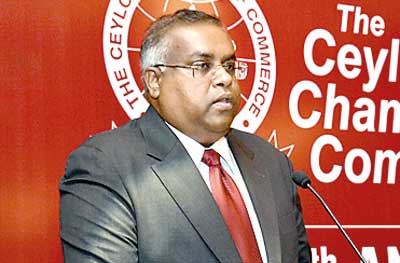Reply To:
Name - Reply Comment
By Chandeepa Wettasinghe
.jpg) The private sector can take great steps towards reconciliation and empowerment in the past conflict stricken areas, according to Northern Province Governor H M G S Palihakkara, who spoke at the 176tth Annual General Meeting of the Ceylon Chamber of Commerce yesterday. “When political leaders fail, apolitical leaders can rise up. The corporate sector can solve many issues, whether real or perceived,” Palihakkara said. He noted that while some infrastructure development has been experienced in the North and East, it has not translated into meaningful results, with GDP per capita and income levels far below the national average. “It doesn’t do much for creating more household income or raising the confidence of the people. Alcoholism, drugs and criminal violence are on the rise in the North,” he noted. Therefore, he said that all stakeholders, including the private sector, must invest more to rectify the situation.
The private sector can take great steps towards reconciliation and empowerment in the past conflict stricken areas, according to Northern Province Governor H M G S Palihakkara, who spoke at the 176tth Annual General Meeting of the Ceylon Chamber of Commerce yesterday. “When political leaders fail, apolitical leaders can rise up. The corporate sector can solve many issues, whether real or perceived,” Palihakkara said. He noted that while some infrastructure development has been experienced in the North and East, it has not translated into meaningful results, with GDP per capita and income levels far below the national average. “It doesn’t do much for creating more household income or raising the confidence of the people. Alcoholism, drugs and criminal violence are on the rise in the North,” he noted. Therefore, he said that all stakeholders, including the private sector, must invest more to rectify the situation.
“The private sector can do much more in SME investment, creating value addition, empowering the fisheries and agriculture sectors, introducing corporate culture to the area, and harnessing the potential of the diaspora,” Palihakkara said.
According to him, many investment opportunities exist, as out of the Rs.20 billion of investment in the Northern Province since 2009, Rs.13 billion had been in power plants.
“The total investment has been only around Rs.7 billion in manufacturing and the hospitality industry. This is a figure we can and must surely improve upon. To invest in value addition,” he added.
He further said that new ferry services and upgrading of the existing ferries could be a lucrative business opportunity as well.
“Inadequate ferry capacities have not only stunted development in the islands, but impaired people to people bonding,” Palihakkara said.
He noted that such investments would promote North-South relationships.
Soft infrastructure should be the focus
 Incoming Chairman of the Ceylon Chamber of Commerce Samantha Ranatunga, taking a leaf of Prime Minister Ranil Wickremesinghe, said that soft infrastructure should be the focus of the country, instead of hard infrastructure projects. “In the last 4-5 years, we have concentrated really hard on the hard
Incoming Chairman of the Ceylon Chamber of Commerce Samantha Ranatunga, taking a leaf of Prime Minister Ranil Wickremesinghe, said that soft infrastructure should be the focus of the country, instead of hard infrastructure projects. “In the last 4-5 years, we have concentrated really hard on the hard
aspect of infrastructure, and we need to be looking at the softer aspects if we are to look at holistic development.
He noted that regional inclusiveness, development of education and strengthening of small and medium enterprises must be the key areas of focus.
“Though we are extremely proud as a country of the economic development we have achieved—the high per capita income, and the general wealth we have created within the economy—if you look at the regional statistics, it makes us wonder, whether we are looking at development in the right perspective,” he noted.
Ranatunga said that the private sector must lead the charge in education through its close partnerships with universities, so that Sri Lanka can compete in global markets with high calibre human resources.